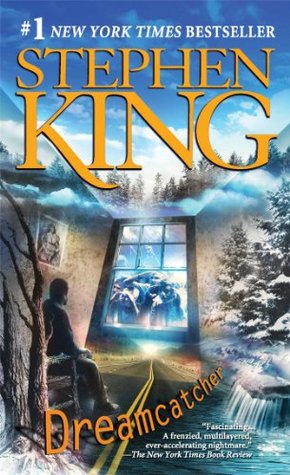More on this book
Community
Kindle Notes & Highlights
You grew up, became a man, had to adjust to taking less than you hoped for; you discovered the dream-machine had a big OUT OF ORDER sign on it.
Some things you didn’t feel safe telling even your closest friends. And sometimes your closest friends knew, anyway.
“You shouldn’t have gone up there,” Jonesy said, but he was touched in a way only Beaver could touch him.
The truth was he always felt better when the Beav was around. Crazy but true.
No, the big deal is that kids sometimes disappear in Derry, Derry is funny that way, and when they do disappear, they are often last seen in out-of-the-way places like the deserted Tracker Brothers depot. No one talks about this unpleasant fact, but everyone knows about it.
Beav could hear Jonesy giggling all the way across the room, still giggling when he went out the door. In spite of everything, Beav was glad to hear that sound.
the Beav’s long black hair or his Doc Martens, which Beaver called his “lesbian solidarity statement.” The Beav had gotten the idea that Doc Martens were a secret sign by which lesbians recognized each other, and no one could talk him out of this.
Henry was crying again. “So long, Beav,” he said. “Love you, man—and that’s straight from the heart.”
Beaver, Pete, Henry. How he had loved them, and how unfairly sudden the severing of their long friendship had been. No, it wasn’t a bit fair—
We weren’t meant to be like this, none of us. Sometimes being alone is better.
TO THOSE LOST IN THE STORM MAY 31, 1985 AND TO THE CHILDREN ALL THE CHILDREN LOVE FROM BILL, BEN, BEV, EDDIE, RICHIE, STAN, MIKE
The years of 1984 and ’85 were bad ones in Derry. In the summer of 1984, three local teenagers had thrown a gay man into the Canal, killing him. In the ten months which followed, half a dozen children had been murdered, apparently by a psychotic who sometimes masqueraded as a clown.
“In any case,” Jonesy said, “the last bad thing to happen was a kind of freak hurricane. It hit on May thirty-first, 1985. Over sixty people died. The Standpipe blew over. It rolled down that hill and into Kansas Street.”
“Almost three quarters of a million gallons of water ran down Upmile Hill, then into downtown, which more or less collapsed. I was in college by then. The storm happened during my Finals Week. My Dad called and told me about it, but of course I knew—it was national news.”
Pete, who is graduating from nothing but the junior class this year, grabs Jonesy, bends him backward like a guy doing a tango with some beautiful chick, and kisses him square on the mouth.
Henry doesn’t bother reading it. Instead he reflects on how odd Derry is about missing children—not like other towns at all. This is June eighth, which means the Rinkenhauer girl has only been gone a day, and yet this poster has been tacked way up in the corner of the notice-board (or moved there), like somebody’s afterthought. Nor is that all. There was nothing in the paper this morning—Henry knows, because he read it. Skimmed through it, anyway, while he was slurping up his cereal. Maybe it was buried way back in the Local section, he thinks, and knows at once that’s it. The key word is
...more
At the north end of the park is a rickety board fence with a sign on it: D.B.&A. R.R. PROPERTY KEEP OUT! Kids have been ignoring this sign for years, and it’s been years since the Derry, Bangor, and Aroostook actually ran freights along the spur through The Barrens, anyway.
There is an ancient and incredibly complex system of drains and sewers beneath Derry, a town which exists in what was once swampland shunned even by the Micmac Indians who lived all around it. Most of the sewer-system was built in the thirties, with New Deal money, and most of it will collapse in 1985, during the big storm that will flood the town and destroy the Derry Standpipe.
It had been an eventful twenty-four hours. He had blown up an alien spacecraft, been betrayed by the man he had regarded as his logical successor, survived a mutiny and a civilian riot, and to top it all off, he had been relieved of his command by a sunshine soldier who had never heard a shot fired in anger.
Mr. Gray didn’t care much for Jonesy’s body (or so he told himself; in truth it was hard not to feel at least some affection for something capable of providing such unexpected pleasures as “bacon” and “murder”), but it did have to take him another couple of hundred miles.
Some dreams die and fall free, that is another of the world’s bitter truths. How many bitter truths there are.


